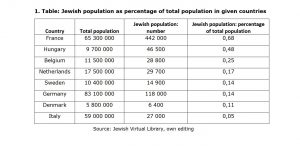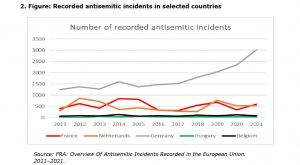
Tamás Róna was astonished to read that the American newspaper's publicist called Viktor Orbán antisemitic.Continue reading

A new study published by Mathias Corvinus Collegium’s Réka Zsuzsanna Máthé gives a comprehensive and up-to-date picture about the state of antisemitic sentiments and incidents in Hungary within a European context.
Máthé’s research points to the fact that the largest Jewish community per capita in the EU lives in France, followed by Hungary, while Hungary is third largest in the EU in terms of total population. Perceptions of antisemitic feelings point out that individuals from France, Belgium, Sweden, and Germany are particularly concerned about rising animosity. In France, Sweden, and Germany, the number of antisemitic incidents show an increasing trend, while in Hungary it has been decreasing in the past years. Most cases of antisemitic incidents are linked to extremist Muslims or left-wing political views. Furthermore, most individuals who chose to emigrate to Israel are from France, while the smallest immigrant community is from Hungary.
Although in the past century the root cause of antisemitism was extreme nationalism, it seems that the newly increasing antisemitic sentiments in Europe are growing among extremist Muslims (30 percent) and the political left (21 percent). Recently, the least amount of incidents has been perpetrated by someone with a right–wing political view (13 percent).

In 2018, a special Eurobarometer poll was carried out on perceptions on antisemitism in all EU countries. The findings showed that there is a relevant difference on perceptions on antisemitism in western, and central and eastern European Member States. More specifically, in six countries, the majority of the population believed that antisemitism had increased in their country: in Sweden (73 percent), Germany (61 percent), the Netherlands (55 percent), France (51 percent), Denmark (50 percent vs 34 percent “stayed the same”).
 As opposed to this, one fifth of the EU respondents believe that antisemitism had decreased in their country over the past five years. These responses came from Romania (29 percent), Hungary (22 percent), Lithuania (21 percent) and Latvia (20 percent).
As opposed to this, one fifth of the EU respondents believe that antisemitism had decreased in their country over the past five years. These responses came from Romania (29 percent), Hungary (22 percent), Lithuania (21 percent) and Latvia (20 percent).
Hostility conveyed in the street or other public places are, however, even more worrying. The majority of respondents from France (80 percent), Sweden (75 percent), Germany (64 percent), Italy, the Netherlands (both 61 percent), and Belgium (59 percent) believe that this is a major issue in their country.
Widespread antisemitism in western Europe does not stop at vandalism and hostility. Years after the mentioned massacres, physical attacks against Jewish people are still a problem in the Member States where vandalism and online attacks are frequent. Respondents from France (83 percent), Sweden (73 percent), Germany (64 percent), Italy (60 percent), and Belgium (56 percent) consider physical attacks a problem in their country.
It is extremely concerning that Western European Jews have experienced a drop in antisemitic incidents only during the period of lockdowns due to the COVID pandemic. In 2020, after the first few waves of the pandemic, with the relaxation of the regulations limiting social contacts, the number of incidents started to rise again. The only country with a decreasing trend is Hungary: the highest number of incidents was recorded in 2013, with 61 reported cases. In 2020 and 2021, there were 30 and 37 incidents recorded in the country respectively.

Hostility, threats, and physical attacks against Jewish people seem to be most prevalent in France, which has the largest Jewish community in Europe. However, the second most unsafe place for Jewish people is Sweden, where only a fraction of the population has Jewish heritage. As opposed to this, the size of the Jewish community in Hungary is almost three times larger, yet the number of recorded incidents is five to eight times lower in Hungary when compared to Sweden. In other words, the large number of antisemitic incidents in France cannot be explained simply by the fact that it has a large Jewish population.
Immigration to Israel, while taking into account the percentage of the total Jewish population of a given country, offers us an idea on the ratio of Jews who are leaving the country – for one reason or another. When compared to the size of the Jewish population, immigration from France is still the highest. It is logical that the country with the highest ratio of Jewish population would be the last European residence to most Israeli immigrants. The same logic would lead us to expect that the second largest immigrant community might come from Hungary, however, just the opposite is the case. When compared to the ratio of the Jewish population, the proportion of Jews who decide to leave Hungary is the lowest of all.
As the data previously presented shows, when compared to western European countries, or Sweden, it is clear that Hungary is a safe country for Jews. Since 2013, through its Brussels office, the Action and Protection Foundation (Tett és Védelem Alapítvány, TEV), has been collaborating with the Prime Minister’s Office in Hungary to exchange and coordinate data on antisemitism nationwide. As a result of joint efforts, Chief Rabbi Tamás Róna stated that “Jews in Hungary are currently experiencing a new heyday.”
It seems that the majority of Jews living in Hungary do feel safe, do not fear expressing their Jewish identity, practicing their religion, and do not consider migrating to Israel. This cannot be said of several other European Member States where the number and gravity of antisemitic incidents are worsening, and more and more individuals are forced to leave their country, concludes the MCC study.
Featured Photo: Facebook MAZSIHISZ